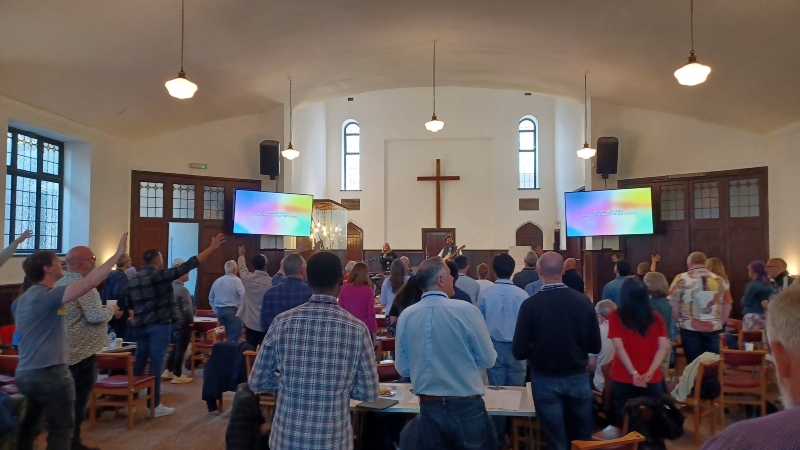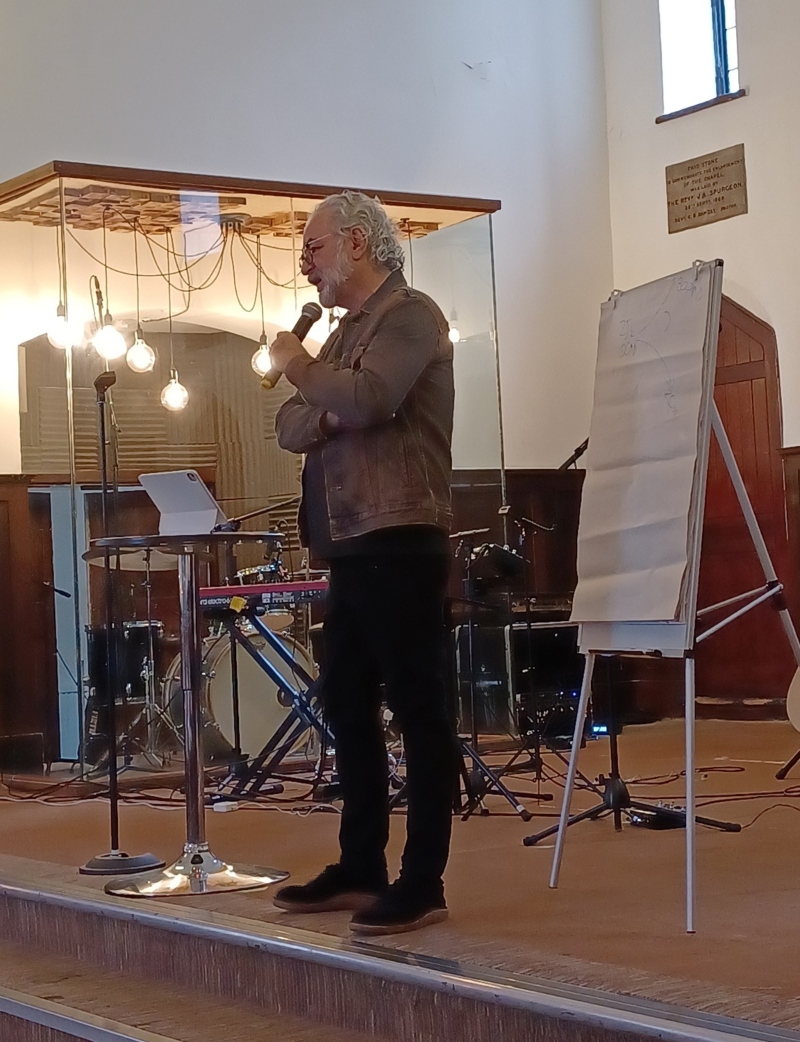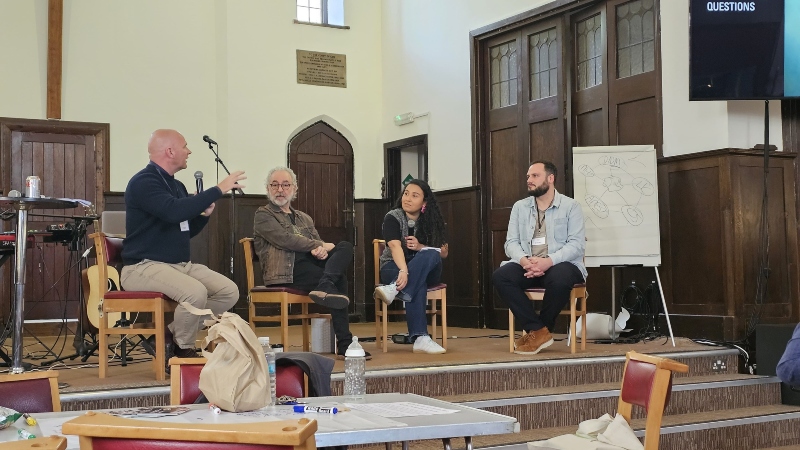'Does this serve Jesus and his kingdom first?'
With input from Alan Hirsch, the latest Everyone Everywhere national conference explored missional togetherness, and how we become less institutional and more movement-oriented. Simon Hall offers this reflection

The early church grew steadily and continuously for 300 years, until at the time of Constantine’s baptism it was probably the largest religion in the Roman Empire, close to a majority. It had no buildings, no assets, no seminaries, no doctrinal unity, no organised hierarchy…
In our own times the church in China shows many similarities to the early church and is similarly under the kind of repression that prevents institutionalisation. Early Christianity was not an empire, nor was it a business, but rather a dynamic movement of transformed and transforming people who, even without a scriptural canon, never mind an agreed strategy, spread the way of Jesus to every corner of the empire and beyond.
Who wouldn’t want to be part of such a movement? Well, in reality, it would appear that many Christians in the West are, at best, resistant to the idea. How do we get from here – a highly institutional church seemingly in terminal decline – to there?
This was the question at the root of a hugely inspiring day for around a hundred Baptist leaders, planters and pioneers with the writer and thought leader Alan Hirsch at Kings Cross Baptist Church. Organised by Everyone Everywhere, St Hild College and 24/7 Prayer, the day was an opportunity to gather to do some deep reflection on the future of the church in the UK.
After worship and an opportunity to slow down and listen to God led by Dot Tyler from 24/7 Prayer, the meeting was introduced by Alex Harris, Director of the St Hild Centre for Church Planting and one of the minds behind Everyone Everywhere.
Delegates had been asked in advance what their biggest single question was about how to become more movement-oriented. Alex presented the five most prominent questions (these are my versions):
-
How can we build confidence in every Christian to share faith and make disciples? How do we move from a church model of ‘service delivery’ to one of disciple-making?
-
How do we develop leadership teams that value apostles, prophets and evangelists as well as pastors and teachers? How do we recognise and equip the diversity of leaders needed for a movement?
-
How can we become a confident movement of multiplying disciples and multiplying churches? Can we put our belief in every-member ministry into practice?
-
How do we harness the multiplicatory potential of small groups? Can we model and generate a culture in which the small and the large help each other flourish?
-
How can Baptists Together become a ‘new wineskin’ for a disciple-making movement?
Delegates were free to choose to be part of one of five conversations around these questions and it was wonderful to see our General Secretary and President-Elect sitting around tables with local ministers, young people, evangelists and church planters, working through some of the practicalities of answering these questions.
 In between times we were treated to reflections from Alan Hirsch. I must confess that I have been a fan of Alan’s work for over 20 years, since the book The Shaping of Things to Come which provided for me a thoroughly biblical mandate for doing church differently. As the minister of what would nowadays be called a ‘Fresh Expression of Church’, Hirsch and his co-author Michael Frost provided me with a Jesus-centred missiology that has shaped my ministry ever since.
In between times we were treated to reflections from Alan Hirsch. I must confess that I have been a fan of Alan’s work for over 20 years, since the book The Shaping of Things to Come which provided for me a thoroughly biblical mandate for doing church differently. As the minister of what would nowadays be called a ‘Fresh Expression of Church’, Hirsch and his co-author Michael Frost provided me with a Jesus-centred missiology that has shaped my ministry ever since.
Like another hero of mine, Tony Campolo, Hirsch has managed to remain acceptable in many theologically conservative spaces, despite the radical nature of his message. He doesn’t have the delivery of a Campolo; instead he has ‘mic drop’ moments like the following:
In a moment of profound revelation, I heard Alan say, ‘We have gospel-centred churches. That means that we have churches that are centred around their interpretation of Paul’s theology of atonement. That is idolatry. If we are not Jesus-centred, we are not the church.’
I felt a profound silence fill the room as the implications of those words sank in.
Hirsch offered us what he called a ‘minimal’ ecclesiology which he observes in both the early and contemporary Chinese churches: Christ-centred, covenant community; worship; discipleship; mission. It sounds so easy but what Hirsch reminded us was that in both these contexts there really was a sense of ‘everyone, everywhere’. In a growing context, new converts will soon become house church leaders, so anything that relies on the expertise of a centralised elite is only going to prevent growth.
This is a profoundly non-conformist ecclesiology, rejecting the clericalist definition of church as word and sacrament ‘done right’.
In the small groups, I was blessed to be part of a group addressing the fifth of the questions above: how do we as a denomination genuinely sow and fertilise a movement? I was struck by the challenge to move from independence to interdependence, and the huge trust we will need to build to enable that kind of relationship, in which the vastly different churches that make up Baptists Together have the confidence and grace to not just work together, but to release new things. Lynn’s recent address at Baptist Assembly was mentioned several times as a hopeful clarion call to missional togetherness.
The day ended with Alan answering questions alongside two folk who are perhaps modelling what this missional togetherness might look like: Isabella Senior is the national Young Leaders Development Coordinator and Josh Kane is a Regional Minister in London, and both serve in their local churches as well. I was struck by the hope that all three expressed, which was infectious.

I returned home to my own church and immediately contacted the minister to say, ‘We need to talk about mission!’
What a providential opportunity it is for us to be able to discuss the new Mission Resolution that was launched at Assembly this year.
I now have a renewed passion to walk through every aspect of my church’s life with just one question, ‘Does this serve Jesus and his kingdom first?’
Simon Hall is a Baptist minister from Leeds, West Yorkshire. He is something of a compulsive starter-upper, which began with starting a band in his teens, a church and community house while he was at university, followed by numerous projects over the years, including churches, charities and an arts centre. He is part of the Northumbrian Collective
A series of follow-up events and webinars have now been organised:
1. Unlocking the power of APEST in evangelism and church planting
A 45-minute taster. Alan Hirsch suggested at the recent Everyone Everywhere national event that APEST can “resolve almost everything.” Whilst perhaps a little tongue-in-cheek, we’ve seen how leveraging the power of the fivefold has released all kinds of mission.
We’ve also seen that an APEST culture is essential for a successful long-term evangelistic and church planting strategy.
If this resonates with you, please join this 45-minute taster to explore what might be possible and useful for you. If you can’t make it, sign up anyway so Simon Goddar can contact you.
1500 Wednesday 26 June 2025
2. The Jesus-Shaped Way: How to Be and Make Disciples the Way Jesus Did
Andy Glover is offering a 45 min taster to give an opportunity to explore whether a coaching huddle (offered monthly over 10 months) is right for you. Andy draws from his experience of leading huddles for the past 10 years both locally in his church, HBC Chester and with leaders across Fresh Streams.
He Invites you to hear more and explore the themes of this huddle to help us reproduce disciples.
Monday 30 June at 3pm
3. Microchurch Learning Huddle Taster Session led by Alex Harris and Chrissy Remsberg
Alex and Chrissy would offer through Firestarters a 1 hr taster session focused on microchurches. This would give folk an opportunity to consider joining one of our regular Learning Huddles that meet for 3 months at a time.
Here's the offering:
Discover the Microchurch Approach - If you attended Everyone, Everywhere: A Conversation with Alan Hirsch, you're invited to a special follow-up session exploring the microchurch model. Whether you're a seasoned practitioner, a curious learner, or a leader in a traditional church exploring new possibilities, this hour is for you. We'll help you discern if joining a Microchurch Learning Huddle is the right next step for your journey.
Thursday, 10 July at 1pm
Register your interest here
4. Both/And Church: Micro Meets Congregation - Online Symposium 16 September
See the image below or click on the link below for more information. More details can be found at sthild.org/symposium or at enquiries@sthild.org.
Both/And Church: Micro Meets Congregation Tickets, Tue, Sep 16, 2025 at 10:00 AM | Eventbrite

Do you have a view? Share your thoughts via our
letters' page.
Baptist Times, 03/06/2025